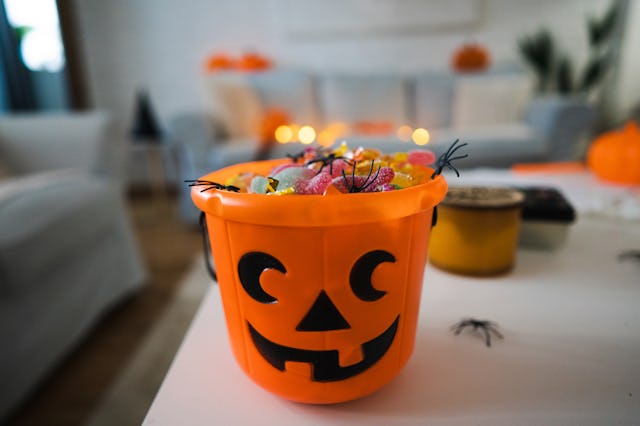When Diet Culture Comes For Your Kid
What happened when my kid came home telling me "Skittles are poison."

I tossed the mini bag of Skittles leftover from Halloween into my daughter's lunchbox, nestled next to a scrap of paper with the joke of the day hastily written in sharpie. Patting myself on the back for being the world's coolest mom, I headed upstairs to drag my kids — still exhausted from trick-or-treating — out of bed for school. That afternoon when they got home, my daughter came storming in, incensed. "Kids at school today were telling me Skittles are poison!"
I was floored. Who is telling their children this? And why? To me, this report broke the sacred, unspoken parental oath reserved for Halloween: "I won't judge your kids' sugar consumption if you don't judge mine."
At the same time, I tried to see this as a teachable moment. Having struggled for decades to develop a healthy relationship with food, and unlearn the harmful messages I'd internalized, here was an organic opportunity to engage in a conversation with my children on the topic.
"Well, what do you think?" A calm, non-judgmental, curious response. Nailed it.
"I told them it wasn't true. I know it's not poison, but why would they say that?" She crossed her arms defiantly.
Her younger brother piped in: "Yeah, it doesn't kill you. I'm not going to stop eating candy!" He ran over to his Halloween bucket to protect it from theoretical interlopers as if people were going to charge in and confiscate a hazardous substance he'd worked so hard to earn.
Here’s my working assumption: Somebody was in a fight with their kids about their candy consumption and said the first fear-mongering thing that came to mind. And on the one hand, I get it: you’re responsible for feeding your kids a balanced diet, and sometimes you’re desperate to get them to stop demanding "just one more piece." But at what cost?
The poison comment triggered something in me. I was truly upset, and it wasn’t just about this one moment; it was about years of hearing about cleansing "toxins" and "clean" eating and realizing these messages were seeping into elementary classrooms. It's an extension of diet culture, under new branding, still assigning moral value rankings to food. And I’m sick of it.
I spoke to Jennifer Anderson, child nutrition specialist and founder of Kids Eat in Color, who shared my concerns. "Children need to understand that it's more than just bad versus good, and it's certainly not poison. That's dangerous in terms of understanding actual poison."
It's also confusing, especially for younger children, who aren't developmentally capable of understanding the nuances. "At the early ages, a child is unable to understand the idea that food is bad for you, but you would not be a bad person if you ate it. So you're adding emotional baggage," says Anderson.
Look, I get it. We’ve all got unlimited access to millions of articles, YouTube videos, and TikToks telling us all the ways we are parenting wrong. It's no wonder we end up desperately clinging to conflicting ideas about what a balanced diet and "healthy" really look like, obsessing about where to place them among the hierarchy on the parental anxieties game board. It's easy to eventually find yourself hunched over the kitchen counter, googling every ingredient in your bread and rifling through your cabinets to trash all the "bad" snacks some lady on Instagram said was making your kid hyperactive.
Far removed from our 80s and 90s childhoods watching adults sustain themselves on SlimFast, diet soda, and Special K, lots of parents now panic about ingredients because they can't pronounce them. We've replaced hysteria about trans fat and high carbohydrate counts with neuroses focused on "clean," "healthy," and "wellness" when it should be about access, safety, and togetherness. Does your water have lead in it? Are there families in your community experiencing food insecurity? Colorado just became only the third state finally to guarantee universal free school lunches instead. The third!
Young children are constantly being served conflicting messages about food. I routinely receive well-intentioned communication from our school district encouraging "healthy" and “good” snack and food choices, but birthdays, class reward systems, and special events are filled with all sorts of normally "off-limit" goodies. The implied message here correlates good behavior or special occasions with "bad" foods, as if it’s something kids must earn. But what makes a specific food good or healthy, anyway?
"Healthy and good are meaningless terms," says Anderson. "What if eggs are healthy to me, but they will kill my friend because they are deathly allergic? It's complicated. We want our children to have a positive perspective, not judge their friends, and also be able to have nuance for themselves."
As most young children lack nuance, it's our job to account for the cognitive gap. And there are lots of ways to do that naturally. My kids have been raised vegetarian, for instance, and so we’ve always emphasized that different people eat different things (like their meat-eating dad!) and that it’s important not to judge what other people eat.
Likewise, Anderson stresses the importance of conversations about food and how parents and caregivers should lay the foundation really early, using positive language around foods in your house. For young kids, this is as simple as, "some foods do a lot of things in your body, some foods do a few things." As they age, the details we provide and the discussions' complexity will also grow.
So, eat with them. Cook with them. And yeah, share that Halloween candy with them. Let children have joy and teach them how to enjoy and savor the experience of all varieties of foods. Skittles aren’t poison, but a culture of shame around something as basic as eating sure is.